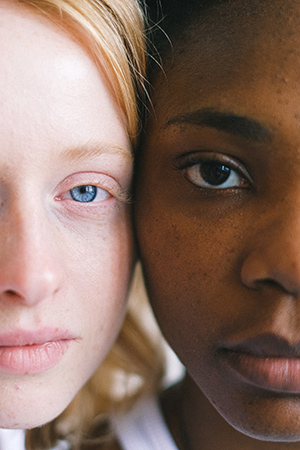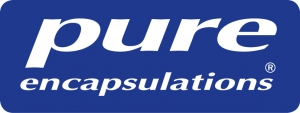The use of digital devices is a normal part of our daily life, and most people don't think twice about it. In fact, you are likely reading this on a screen right now. But, unfortunately, our reliance on screens has a downside.
Studies have shown that people who use screens more often are at risk of developing age-related eye conditions.i The concern has to do with increased exposure to a potentially damaging type of light emitted from your device — blue light.
Fortunately, certain nutrients that you can get from your diet and supplements may help reduce the impact of this exposure. Since screens don't seem to be going away anytime soon, taking steps to protect your eyes now is a wise choice.

What is blue light?
Blue light is a type of light generated by computer screens, smartphones, and other digital devices. It’s high-energy light that is part of the visible light spectrum. The sun is also a significant source of blue light, but because of the increased reliance on screens, our exposure to blue light has risen dramatically in the last few decades.
Some blue light exposure, primarily from the sun, is good for us. It helps regulate our circadian rhythms (sleep and wake cycle), keeps us alert, and supports a healthy cognitive function. But, when you spend too much time in front of a screen, the blue light adds up quickly and can be harmful to your eyes.ii
Blue light can also interrupt our sleep cycle as it suppresses melatonin production. While this is desirable first thing in the morning when you greet the sun, late-night screen use can also increase alertness, leaving you wide awake when you should be sleeping.iii
Blue light and the impact on eye health
Eye strain and fatigue are increasingly common complaints as more time is spent looking at screens or digital devices that emit blue light. Long-term exposure to blue light has also been found to significantly impair vision. Over time, blue light is associated with retinal cell damage and vision issues.iv
Excess screen use, especially on phones, has exponentially increased our exposure. Blue light can penetrate deeper into your eye, and nearly all visible blue light reaches the retina.i This can cause eye strain, dryness, and even retinal damage.
Research has found that excessive use of screens nearly doubles the risk of certain conditions affecting eyesight in teenagers.v Blue light exposure can also lead to increases in inflammation that exacerbate oxidative damage to your eyes.vi

What is the association between carotenoids and eye health?
Lutein and zeaxanthin are two carotenoids that may help protect your eyes from oxidative stress because they are powerful antioxidants.vii These nutrients are found in food, but they also accumulate in the eye.
One measurement of eye health is macular pigment optical density (MPOD). This measures the amount of lutein and zeaxanthin in your eyes. Macular pigment can act as a filter for damaging light and an antioxidant to protect eyes against free radical by-products.viii
People with lower MPODs have an increased risk for eye conditions, especially as they age. Oppositely, those with increased optical density have a much lower incidence of eye-related disease and improved vision.vii Further, studies show that those who consume higher amounts of lutein and zeaxanthin maintain better levels of macular pigments and, therefore, have healthier eyes.ix x
How can lutein and zeaxanthin help reduce the impact of blue light damage to your eyes?
Supplementation with lutein and zeaxanthin is associated with many eye health benefits related specifically to blue light exposure. As these carotenoids are potent antioxidants, they may help reduce oxidative damage in the eye caused by blue light exposure.
Lutein and zeaxanthin supplementation can also help support eye health by reducing blue light oxidative damage on the outer layer of the eye. They also support increases in MPOD and may interrupt the inflammatory process triggered by blue light damage, reducing the risk of associated eye conditions.v
It also appears that the amount of lutein and zeaxanthin you have in your diet is correlated with increased amounts of carotenoids in your eyes.xi Research suggests that when found in the eye, carotenoids can help absorb and filter blue light and therefore add even more protection against potential damage from digital device exposure.xii
Studies have also found that lutein and zeaxanthin intake can support reductions in side effects like headaches, strained and tired eyes, or other symptoms related to screen time.xiii
What foods are good sources of lutein and zeaxanthin?
The body can’t make these carotenoids, so you have to obtain them through diet. However, most people don’t eat enough carotenoid-rich foods, so supplements are often needed for benefits.
Foods considered good sources of lutein and zeaxanthin include9:
- Kale
- Spinach
- Broccoli
- Peas
- Lettuce
- Egg yolk
- Wheat
- Corn
How can vitamin A also help protect against blue light exposure?
Vitamin A is a group of nutrients known as either preformed vitamin A (found in animal products) or provitamin A (found in fruits or vegetables). While rare in many developed countries, vitamin A deficiency is one of the leading causes of impaired vision.xiv It’s an essential nutrient responsible for maintaining healthy eye tissue and fluid. It also helps preserve night vision, increases visual acuity, and plays a vital role in the prevention of age-related declines in vision.xv
As mentioned, blue light is a high-energy type of radiation. As a result, it can pass through the cornea to the retina and cause damage. While more studies specifically on blue light and vitamin A are needed, as an antioxidant vitamin A may add protection by supporting the reduction of oxidative damage to the retina.xvi
Nutrients provide powerful protection for your eyes
The screens we use every day emit blue light that can damage our eyes and cause age-related vision impairment. Given how prevalent screens are in our everyday lives, it’s essential to take steps to protect your vision in the future.
Boosting your intake of lutein, zeaxanthin, and vitamin A-rich foods or supplements can be an important way to help reduce the impact of screen-use and support healthy eyes.

i Sheppard AL, Wolffsohn JSDigital eye strain: prevalence, measurement and ameliorationBMJ Open Ophthalmology 2018;3:e000146. doi: 10.1136/bmjophth-2018-000146.
ii Zhao, Zhi-Chun, Ying Zhou, Gang Tan, and Juan Li. “Research Progress about the Effect and Prevention of Blue Light on Eyes.” International Journal of Ophthalmology 11, no. 12 (December 18, 2018): 1999–2003. https://doi.org/10.18240/ijo.2018.12.20.
iii Chang, Anne-Marie, Daniel Aeschbach, Jeanne F. Duffy, and Charles A. Czeisler. “Evening Use of Light-Emitting EReaders Negatively Affects Sleep, Circadian Timing, and next-Morning Alertness.” Proceedings of the National Academy of Sciences of the United States of America 112, no. 4 (January 27, 2015): 1232–37. https://doi.org/10.1073/pnas.1418490112.
iv Vicente-Tejedor, Javier, Miguel Marchena, Laura Ramírez, Diego García-Ayuso, Violeta Gómez-Vicente, Celia Sánchez-Ramos, Pedro de la Villa, and Francisco Germain. “Removal of the Blue Component of Light Significantly Decreases Retinal Damage after High Intensity Exposure.” PLoS ONE 13, no. 3 (March 15, 2018). https://doi.org/10.1371/journal.pone.0194218.
v Hansen, Mathias Hvidtfelt, Poul Pedersen Laigaard, Else Marie Olsen, Anne Mette Skovgaard, Michael Larsen, Line Kessel, and Inger Christine Munch. Acta Ophthalmologica 98, no. 3 (May 2020): 315–21. https://doi.org/10.1111/aos.14242.
vi Bian, Qingning, Shasha Gao, Jilin Zhou, Jian Qin, Allen Taylor, Elizabeth J. Johnson, Guangwen Tang, Janet R. Sparrow, Dennis Gierhart, and Fu Shang. “Lutein and Zeaxanthin Supplementation Reduces Photooxidative Damage and Modulates the Expression of Inflammation-Related Genes in Retinal Pigment Epithelial Cells.” Free Radical Biology & Medicine 53, no. 6 (September 15, 2012): 1298–1307. https://doi.org/10.1016/j.freeradbiomed.2012.06.024.
vii Bernstein, Paul S., Binxing Li, Preejith P. Vachali, Aruna Gorusupudi, Rajalekshmy Shyam, Bradley S. Henriksen, and John M. Nolan. “Lutein, Zeaxanthin, and Meso-Zeaxanthin: The Basic and Clinical Science Underlying Carotenoid-Based Nutritional Interventions against Ocular Disease.” Progress in Retinal and Eye Research 50 (January 2016): 34–66. https://doi.org/10.1016/j.preteyeres.2015.10.003.
viii Christaras, Dimitrios, Harilaos Ginis, Alexandros Pennos, Juan Mompean, and Pablo Artal. “Objective Method for Measuring the Macular Pigment Optical Density in the Eye.” Biomedical Optics Express 10, no. 7 (June 24, 2019): 3572–83. https://doi.org/10.1364/BOE.10.003572.
ix Ahmed, Shazia S., McGregor N. Lott, and Dennis M. Marcus. “The Macular Xanthophylls.” Survey of Ophthalmology 50, no. 2 (April 2005): 183–93. https://doi.org/10.1016/j.survophthal.2004.12.009.
x Abdel-Aal, El-Sayed M., Humayoun Akhtar, Khalid Zaheer, and Rashida Ali. “Dietary Sources of Lutein and Zeaxanthin Carotenoids and Their Role in Eye Health.” Nutrients 5, no. 4 (April 9, 2013): 1169–85. https://doi.org/10.3390/nu5041169.
xi Wenzel, Adam J., Catherine Gerweck, Damian Barbato, Robert J. Nicolosi, Garry J. Handelman, and Joanne Curran-Celentano. “A 12-Wk Egg Intervention Increases Serum Zeaxanthin and Macular Pigment Optical Density in Women.” The Journal of Nutrition 136, no. 10 (October 2006): 2568–73. https://doi.org/10.1093/jn/136.10.2568.
xii Junghans, A., H. Sies, and W. Stahl. “Macular Pigments Lutein and Zeaxanthin as Blue Light Filters Studied in Liposomes.” Archives of Biochemistry and Biophysics 391, no. 2 (July 15, 2001): 160–64. https://doi.org/10.1006/abbi.2001.2411.
xiii Stringham, James M., Nicole T. Stringham, and Kevin J. O’Brien. “Macular Carotenoid Supplementation Improves Visual Performance, Sleep Quality, and Adverse Physical Symptoms in Those with High Screen Time Exposure.” Foods 6, no. 7 (July 2017): 47. https://doi.org/10.3390/foods6070047.
xiv Mayo-Wilson, Evan, Aamer Imdad, Kurt Herzer, Mohammad Yawar Yakoob, and Zulfiqar A. Bhutta. BMJ (Clinical Research Ed.) 343 (August 25, 2011): d5094. https://doi.org/10.1136/bmj.d5094.
xv Rasmussen, Helen M, and Elizabeth J Johnson. “Nutrients for the Aging Eye.” Clinical Interventions in Aging 8 (2013): 741–48. https://doi.org/10.2147/CIA.S45399.
xvi Khoo, Hock Eng, Hui Suan Ng, Wai-Sum Yap, Henri Ji Hang Goh, and Hip Seng Yim. Antioxidants 8, no. 4 (April 2, 2019). https://doi.org/10.3390/antiox8040085.
Share:
Related Posts

Benefits of Creatine in Perimenopause and Menopause
Written by Maura MacDonald, MS, RD, CSSD | 2025 As we age, the notion is that we will inevitably become weaker. Not as mobile as

Goodbye Pie Chart, Hello Phase 1 Sliders
Written by Allison Smith, ND | 2025 As we usher in a new era of DUTCH testing which leaves behind the concept of the three-way

Introducing the DUTCH Dozen
Written by Kelly Ruef, ND | 2025 Hormone testing can be complex, which is why Precision Analytical developed the DUTCH Dozen, an interpretive framework that

DUTCH Report Enhancements
Written by Hilary Miller, ND | 2025 Precision Analytical have released the newest version of the DUTCH Test. This is the report’s most significant update

Gallbladder Health 101: What It Does and How to Keep It Working Well
Written by Ashley Palmer & Pooja Mahtani | 2025 The gallbladder may not get much attention compared to the gut, but it plays a central

